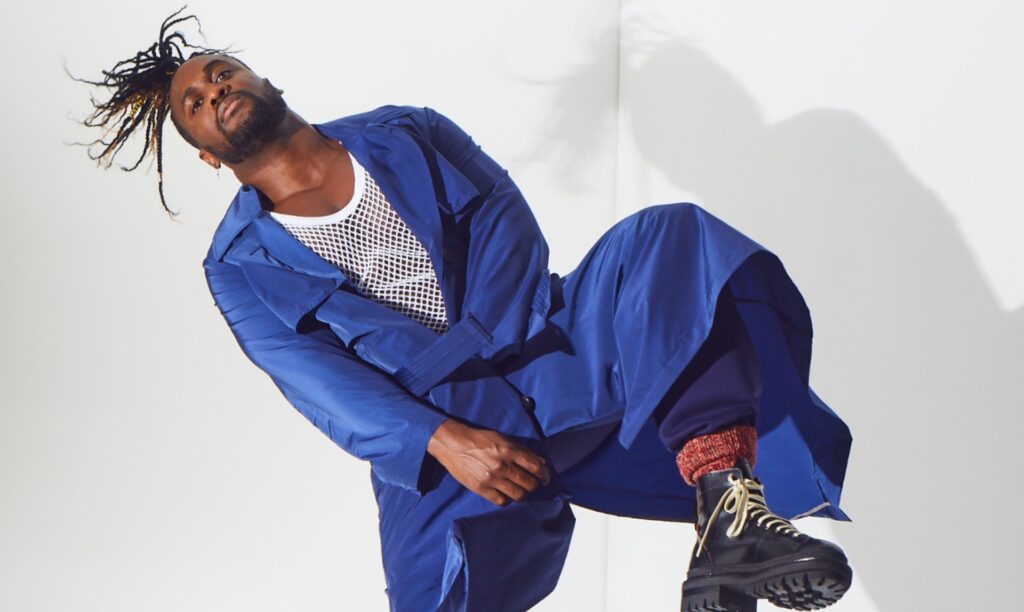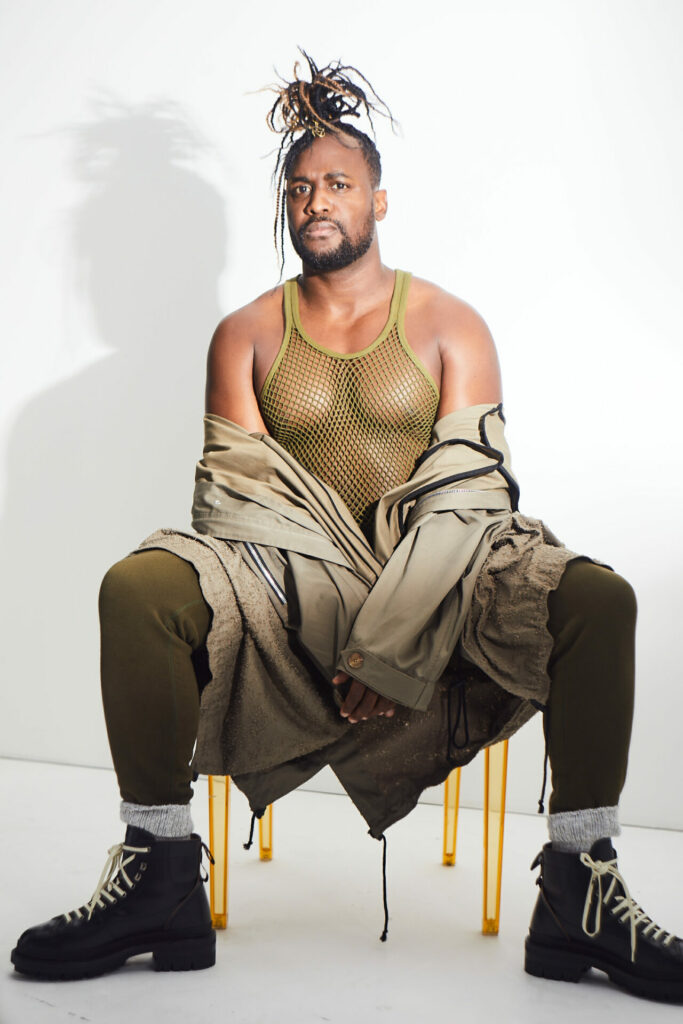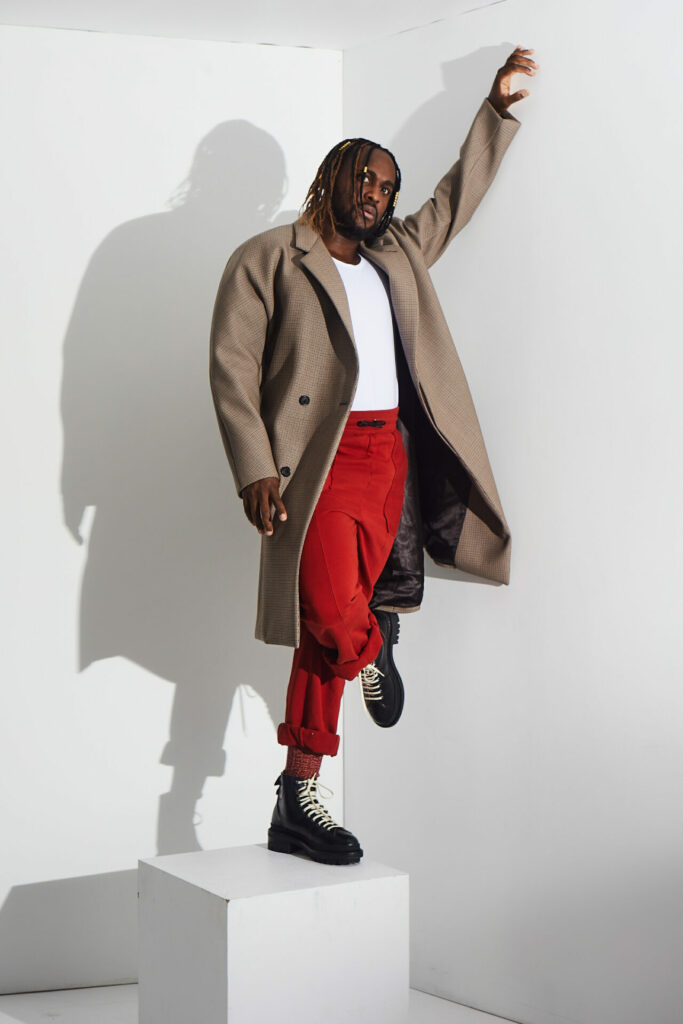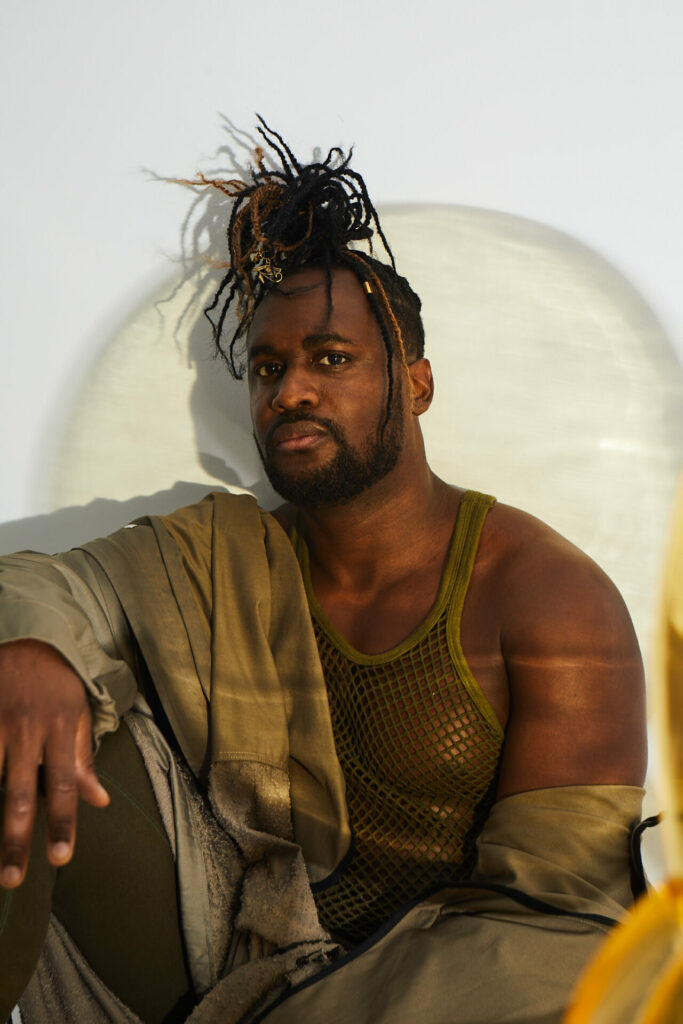Kadiff Kirwan interview: ‘I bloody love being queer – it’s a beautiful thing’
Exclusive: With roles in Fleabag, Chewing Gum, Black Mirror, and now spy drama Slow Horses, multi-talented actor, writer and all-round awesome human Kadiff is the epitome of being Black, queer and fabulous
By Lee Dalloway

It’s easy to get cynical when you’re in the business of show. But you’d be hard-pressed to find someone as positive, inspiring and grateful as the talented Kadiff Kirwan.
Born on the tiny Caribbean island of Montserrat (population: approx. 5,000), he was whisked away to a Preston council estate as a child. It’s an experience he describes as “beyond culture shock”.
Although Kirwan attests to having zero trouble from his peers, the fish-out-of-water combo of being the only Black person in school, with a thick Caribbean accent, religious parents and identifying as queer led to some youthful acting out.
“I was bad in school,” Kirwan admits. “I was suspended a couple of times; I put it down to the fact I always knew I was queer. When you’re encased in a really religious upbringing in an environment you’re not accustomed to… I felt alone. I had a drama teacher — shout out to Ms Heywood Conner! — who said, ‘I think you need to come to drama class to channel…’ She didn’t say ‘aggression’. She said ‘channel your feelings.’” he laughs.

“Thank God, she saw something in me and kept on at me. I wouldn’t be in this industry if she hadn’t been so insistent.”
The world of theatre not only saved him from going down an avenue he may have regretted but it remains the creative outlet where his heart truly lies to this day. “I cut my teeth there. It’s community personified,” he beams. “You’re spending all your time with these people and if you have a bad show, or if you fluff a line, or even skip two pages, you can fix that the next day. I love TV and film. But once you’ve shot it, it’s the world’s now.”
After getting down to the finals for the stage production of The Lion King at just 17, a move to London and a place at the capital’s Central School of Speech and Drama is where Kirwan finally found his identity. “I stepped into my power,” he says. Not with arrogance or through the need to make a statement — that’s not his bag. But with a calm, effortless confidence that both puts you at ease and inspires as you talk with him.
“My mum and dad weren’t handing anything out when it came to education,” he reflects. “But I needed that structure. I was supposed to be an accountant! Two years into drama school, my dad still thought I was at uni doing accounting. I worked in Marble Arch in this Michelin-star restaurant. And I observed and was exposed to a lot of things in that environment.”
“I was the only Black male in my year, which my teachers loved to remind me”
Kirwan once again found that he was the only Black male in his environment while at drama school. Although a screening of slavery series Roots at his high school had led to month-long hollers of “Kunta Kinte” from his classmates (a joke for them, maybe, but a clear microaggression), this time, Kirwan took action against being singled out, which had positive consequences for him and those who followed him.
“Again, I was the only Black male in my year. Which my teachers loved to remind me. There were only six of us who didn’t go to boarding school. It was a massive culture shock being around these privileged, middle-class people. I said to the teachers that studying seven white playwrights and not touching on one Black one isn’t on. Then being told, ‘It’s not how the course is run. You’re the first Black guy we’ve taken.’ I’m, like, ‘This isn’t charity. I’m not doing this for free – I’m putting myself into debt! You need to come correct!’”
Having found his voice and life mission during training, it was a variety of theatre roles that cemented Kirwan as a diverse performer who is equally at ease playing straight family men as he is playing Black gay characters — although those roles aren’t always being written.
He was, however, quick to weed out those parts that could potentially pigeonhole him fairly early in his career. “The things that initially landed in my inbox, it was very council estate, ‘shank shank’, ‘stab stab’. I had that conversation with my agent early on. This wasn’t my narrative growing up. I’m not going to perpetuate it. I’m not going to play it. I was holding out for things that weren’t that.

“The beauty of that was I landed in comedy. You can disarm people when you make them laugh. The range I got to play in comedy really helped me move on to doing more drama.” And if he doesn’t like the scripts that are offered to him, Kirwan is going to craft them himself. “I write now, too. I’m not writing what’s come before. I’m not waiting for a knight in shining armour to create these roles. We’ve got so much more room now to tell our own stories, change the way we’re perceived and play aspirational characters. You can still have drama, violence. But I don’t want to see 14-year-old kids on bikes passing drugs. It’s been done.”
When Kirwan discusses the multitude of characters he’s had the chance to play, that early cherry-picking defiance proved to be a masterstroke, particularly in an industry renowned for wanting people to stay in their boxes. In just the past five years, he’s brought to life a Caribbean native who discovers his queerness during the Second World War as part of BBC Four/Young Vic Theatre’s 50-year celebration of the decriminalisation of homosexuality. He’s also sung Beyonce’s ‘Halo’ at the National Theatre as a hostel runaway. And he’s now starring in Apple TV’s smash-hit comedy drama Slow Horses as an MI5 agent who’s married with kids — a role he describes as “very grown-up. This is mortgages and paint swatches as opposed to binge drinking.”
“I can wear the pink outfit, wear the blue outfit, I want to use every single crayon in my box”
Boasting a stellar cast that features Gary Oldman, Kristin Scott Thomas and Sophie Okonedo — no pressure there, then — Kirwan gets to stretch his chops not just as a quiet family man with lots of demons, but also as a fully fledged action hero. “It gave me a new lease of life. I never saw myself doing gun-wielding, running, stunts. I’m so happy I’m doing it.” And who knows what this could lead to in the future. “007, 00Kadiff — why not!” he laughs. “I feel grateful I can do the things we all want to do and play range, I can wear the pink outfit, wear the blue outfit, I want to use every single crayon in my box.”
The boldness with which Kirwan approaches his career, and life, could easily stem from probably the boldest thing many of us have had to do. Coming out to his family. And it wasn’t an easy journey for Kirwan. “Coming out was terrible. It was bad, bad, bad. My older brother came out for me. I physically couldn’t say the words to my dad. But it was probably one of the best gifts I was given. My family really struggled with it.

“My mum came round way quicker than my dad,” he remembers. “For them, it was unknown territory, just like going into acting. They’d been fed the narrative that being queer, just like acting, was going to be a hard life and that if you’re queer you can’t be happy. They just wanted the best for me. But I’ve got happiness in spades. And that was in part provided by what they gave to me growing up.”
Kirwan manages to stay positive despite the very recent loss of both his parents; his mother to pancreatic cancer and his father to Covid. But he also confirms that, after an initially painful coming-out, they both eventually accepted him. “I’m so grateful that both my mum and dad knew exactly who I was. They accepted me wholeheartedly. That was one of the best gifts that time gave to me. Just that we could have this honest relationship and that they were proud of me. Towards the end, it was so cool. And my mum actually had more issues with the fact I was vegan,” he laughs. “Nothing changed, they saw within my career it wasn’t a hindrance in any way. I’m not missing out on anything.”
“I bloody love being queer – it’s a beautiful thing”
Although Kirwan is sadly still a fairly rare breed in the acting world, he attests that he doesn’t feel the need to set an example. “I don’t feel a pressure, but a responsibility to show that queerness comes in all shape and forms. It’s not a hindrance, anyway. It’s not negatively affected my career. But it’s my armour. I bloody love being queer. It’s a beautiful thing to be. Inbuilt in us is a tenacity to fight for who we are. And I get to channel that into my roles. If that can help the next generation or someone who doesn’t have contact with a lot of gay people, that’s great.”
Kirwan cites his own influences as predominantly female, having worked with the likes of Michaela Koel, Phoebe Waller-Bridge and Aisling Bea and being inspired by their work ethic. “I learnt that God is a woman, and women run the world,” he remarks. “If I get to spend my entire life just working with multi-talented women, I’m fine with that. Those women all grafted. They all had 20 scripts that didn’t make it. Seeing their perseverance and tenacity makes me want to get a piece of that.”
With a big new comedy for Channel 4 coming up, and his own script in the works with BBC Studios, Kirwan’s ‘power’ is currently at maximum voltage. For those looking to follow in his footsteps, he has some advice, too. “Find out what your taste is, what do you want to say and do, find the lane you want to go down,” he says. “Go to see some shows. If you can’t afford it, nick someone’s streaming account and watch stuff. Write to people. Make your own content.
“There’s an incredible charity called Open Door that’s set up for people from poor socio-economic backgrounds that want to audition for drama school. They’ll pay for that and help you get into the industry,” Kirwan furthermore adds. “And if you want advice, slide into my DMs. If I’ve got any pearls of wisdom, I’ll respond to you in there.”
